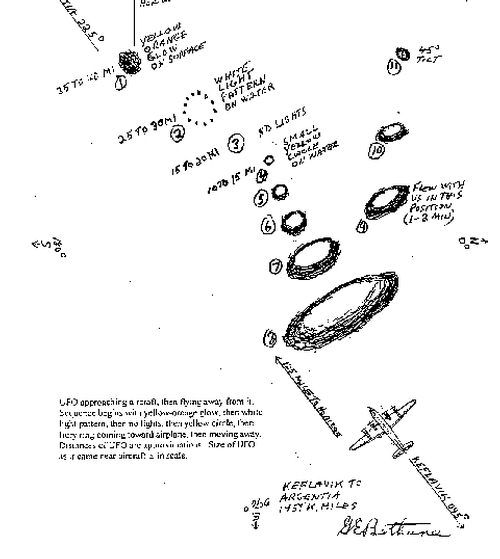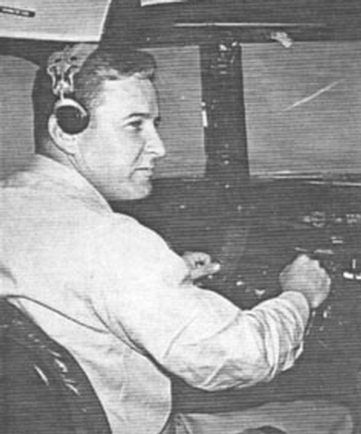UFO Case Report:
The Bethune / Gandor Air Encounter
Date: February 10, 1951
Location: Gandor, Newfoundland, Canada
US Naval Reserve Lieutenant Graham Bethune, copilot of Flight 125, first sighted a huge object [at least] 300 feet in diameter on a near collision course with their aircraft. "A rough estimate would be at least 300 feet in diameter, over 1,000 miles per hour in speed, and approached to within 5 miles of the aircraft."
|
Video
Clip Graham Bethune presenting testimony about his 1951 UFO encounter, during the Disclosure Project Press Conference in Washington, D.C. on May 9, 2001. (credit: Disclosure Project) |

This is an annotated drawing by Graham Bethune explaning the movements and changes of aspect of the flying disk during the whole observation. (Credit: ufologie.net)

Pilot Graham Bethune.
Classification & Features
Type of Case/Report: StandardCase
Hynek Classification: RV
Shape of Object(s): Disc
# of Witnesses: Multiple
Special Features/Characteristics: Pilot/Aircrew, Military, Radar, Witness Photo, Witness Sketch
More Articles on this Case
Encounter Above the Atlantic
Donald Kehoe, 1960
It was early in '59 when I learned of this hidden report - a startling encounter with a UFO (Unidentified Flying Object). This one stood out in importance. R
Print / Other References
Steven Greer, MD, 'Disclosure', 2001, pp. 112-127.
Full Report / Article
Source: Disclosure Project / NICAP website / ufologien.net
[go to original source]
Case Summary by Dominique Weinstein:
Gandor Case Synopsis - February 10, 1951, Off Newfoundland, Canada
On February 10, a US Navy flight, Atlantic/Continental Air Transport Squadron one, located at USN Air Station, Patuxent River, Maryland, was out of Keflavik, Iceland at 49-50 degrees north latitude and 50-03 degrees west longitude about 150 kilometers [90 miles] west of Gander, Newfoundland out over the Atlantic Ocean. The aircraft was probably bound for Gander to refuel judging by its position and course of 230 degrees true, though the report does not mention this. US Naval Reserve Lieutenant Graham Bethune, copilot of Flight 125, was occupying the captain¹s seat on the left side of the cockpit in the passenger plane when he first sighted a huge object [at least] 300 feet in diameter on a near collision course with their aircraft.
The copilot stated in his official report, "...I observed a glow of light below the horizon about 1,000 to 1,500 feet [330-470 meters] above the water. We both [the pilot as well] observed its course and motion for about 4 or 5 minutes before calling it to the attention of the other crew members. ...Suddenly its angle of attack changed. Its altitude and size increased as though its speed was in excess of 1,000 miles [1,670 kilometers] per hour. It closed in so fast that the first feeling was we would collide in mid air. At this time its angle changed and the color changed. It then [appeared] definitely circular and reddish orange on its perimeter. It reversed its course and tripled its speed until it was last seen disappearing over the horizon."
The copilot¹s report goes on to say that the object came within five miles of their aircraft which was borne out by radar evidence of the encounter because the object had been tracked by DEW Line Ground Radar at the base in Goose Bay, Labrador.
--------------------------------------------------
Graham Bethune's testimony at the Disclosure Project Press Conference at the National Press Club, Washington, D.C., 2001.
"About 300 miles outside of Argentia, Newfoundland, I saw a glow on the water. As we approached this glow, it turned into hundreds of circles of white lights on the water. We watched it for a while; when the lights went out, there was nothing on the water. The next thing that we saw was a yellow halo that was very small, about 15 miles away. It came up to 10,000 feet in a fraction of a second. I disengaged the autopilot and pushed the nose over, because I was going to go under it at the angle that it was coming toward me. The minute that I did that, it was up at our altitude and I could see nothing outside of the cockpit but this craft."
"I didn't know which way to go. Then all of a sudden I heard a racket. I didn't know what it was. And I said: 'What the hell was that?' One of the crewmen looked around and said: 'Everyone [in the plane] was ducking [down] and they collided [with each other]. They were all lying on the [floor of the plane]."
"Then [the UFO] appeared over to the right, moved out slowly and flew with us. It was not at our altitude, but we could see the shape of it. It was a dome and I could see the coronal discharge. I went back aft, let the other pilot, Al Jones, take my seat, and went to see if the passengers were OK. They had some bumps and bruises. One passenger was a doctor so I went to him first. I said: 'Doc, did you see what we saw?' He looked me straight in the eye and said: 'Yeah, it was a flying saucer.' He said: 'I didn't look at it because I don't believe in such things.' It took me a couple of seconds to realize what he was saying. Being a psychiatrist, he couldn't believe in that kind of thing."
"So I went back to the cockpit and said, 'Al, whatever you do, don't tell anybody we saw anything. They will lock us up as soon as we get on the ground.' He says: 'It's too late. I just called Gander control [in Newfoundland] to see if they could track this by radar.' So that's how the story got out."
"It was obvious from the questions and demeanor of the US Navy men who debriefed us that they'd seen things out there before. When the crew returned to the Patuxant River Naval Air Test Center in Maryland, they required that each of us writes a report."
Case ID: 980
edit: 980
FAIR
USE NOTICE: This page may contain copyrighted material the
use of which has not been specifically authorized by the
copyright owner. This website distributes this material without
profit to those who have expressed a prior interest in receiving
the included information for scientific, research and educational
purposes. We believe this constitutes a fair use of any such
copyrighted material as provided for in 17 U.S.C § 107.





